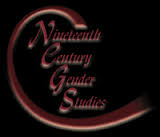 Age and Gender: Ageing in the Nineteenth Century
Age and Gender: Ageing in the Nineteenth Century
Nineteenth Century Gender Studies Special Issue, Summer 2017
Guest Edited by Dr Alice Crossley, University of Lincoln
This special issue of Nineteenth Century Gender Studies will bring together two crucial aspects of identity formation and experience, age and gender, in order to consider the ways in which each may be mutually-informed by the other. Both gender and categories of ageing provoke similar questions about their own social construction, and the role of nature or biological determinacy. Literary, artistic and historical engagements with the social imperatives that sought to proscribe their nature and scope reveal much about the dynamic ways that both gender and age impacted on life and subjectivity across the century.
Age studies forms a compelling basis for new developments in literary-historical work, and as such is gaining momentum across several disciplines from the humanities and social sciences. This edition of NCGS invites engaging new scholarship in revealing intersections of gender and age, and how conceptions of ‘age’ and ‘ageing’ are used to produce differentiations of race, class, and sexuality in the years between 1789 and 1914. As Kay Heath has argued, ‘To exclude the concept of age is not only to ignore, but also to deny, its pervasive influence on the way culture constructs our identity as humans and by such denial to remain unconscious of and therefore vulnerable to age’s hegemonic intensity.’ The consciousness of ageing, and the cultural significance and ‘hegemonic intensity’ that such consciousness upholds, consequently informs the construction and development of views on gender identities in the period, and essays are therefore invited for this special issue which embrace Heath’s proposal about the ‘pervasive influence’ of age in light of gender studies.
This issue of NCGS will address a range of gender issues through the lens of age studies, and vice versa. In doing so, such a dualistic approach will highlight the complementary modes of study that each of these theoretical frameworks employ. Both age and gender are understood in terms of social construction and performance, and speak clearly to one another in the clarification and development of a pliable self-identity. Both can be explored in relation to subjection or marginalisation and power or agency, and both are largely involved in the articulation of body image and representation (to include disability), as well as engaging closely in debates about sexuality, developments in education, theories of evolution or recapitulation, and the political landscape of nineteenth-century Britain and her colonial outposts. When examined together, then, gender and age can both speak eloquently to the construction of selfhood throughout the nineteenth century (in addition to providing comparative opportunities for considering similar issues in our own society).
The guest editor of this special issue invites scholars working on any aspect of the nineteenth century to submit critical analyses on the intersections of age and gender. Some topics for articles might include (but are not restricted to):
Please send articles of 5-8,000 words to acrossley@lincoln.ac.uk by Monday, 10 April 2017 (earlier submission is encouraged). Adhere to MLA style, using endnotes rather than footnotes. Please include a coversheet that includes your contact information and a short (100-150 word) bio with your article submission. Enquiries about potential essay topics are welcome.